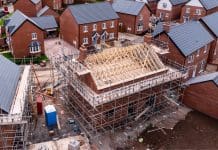Whilst the number of self-builders in the UK is much smaller than in other European countries, a survey commissioned by the Building Societies Association (BSA), published in October 2011, suggested that 53% of people in the UK would consider building their own home given the opportunity
It’s a huge task, and one which shouldn’t be undertaken lightly. But a vital factor which many self builders can often overlook is insurance. There are a number of different policies and covers you might require depending on the nature of your project, and deciding which one to opt for can be a little confusing. But fear not – Advantage Home Construction Insurance are here to help.
In this piece, we’ll be helping you cut through the noise and make an informed decision as to which insurance policy you’ll need for your self-build.
Be smart
Some people want to be as hands-on as possible, and build their new home or space entirely from scratch with their own two hands. However, not everyone has the skills or knowledge required to do so, thus some self-builders may call in the help of contractors and take on more of a project management role.
In these scenarios, many people think that if their contractors have public liability insurance, then they’re covered. Unfortunately, that is definitely not the case – it only covers the contractor or tradesman against their liability to you for negligence or error (and even then, you have to prove their negligence). It doesn’t cover anything which might happen to your property, e.g. fires, floods, big accidents or storms. You also won’t be covered if you damage a neighbour’s property or cause injury to anyone.
It’s also a common myth that if contractors have “contractors all risks cover”, then you’re covered. This is slightly more complicated – so long as the contractor’s policy is valid, with a limit which meets or exceeds the full rebuilding cost of the project, there’s a “written contract” between both parties stating that the contractors are responsible for the development up to the point of handing you the keys to the completed property. However, if a third party is building the shell and you’re taking over from there, then as soon as they leave site so will your cover.
Extensions, renovation projects and conversions all involve an existing structure which need to be insured correctly (e.g. the house which is being extended). It’s crucial that the part of the building which was already there gets the correct insurance, and the misconception is that your home insurance covers the works during the course of the extension/renovation. In fact, a huge number of home policies don’t include alteration or renovation as standard. It’s always best to speak to your provider about it, as they may offer you some cover, but likely only on a “named perils” basis (think natural disasters).
So, which insurance is right for you?
Site insurance
A site insurance policy is a specialist product designed to cover projects such as self-builds. Naturally, as self-builds themselves are complex, the policies are also complex and don’t read like home & contents ones. However, they normally cover all risks of physical loss or damage (which is a lot better than just named perils). These policies can usually be extended to include existing structures on an all risk basis.
Structural warranty
A structural warranty is a policy which covers houses against defects during the design process; materials used, and can also protect against the craftsmanship itself causing major damage. It also covers defective drainage and weatherproofing.
Structural warranties cover policyholders for ten years starting from when you receive your completion certificate. They also allow prospective purchasers to obtain a mortgage on the property should you want to sell it on.
If you choose to get a structural warranty, the provider will assess the design of the build and the construction in a series of technical audits. Defects identified along the way then have to be made good prior to issuing cover.
Our biggest piece of advice? Arrange the warranty early on! The further through the project you leave it, the more money you’ll end up paying. Why not contact our team about a quote today?
Important considerations
Always read the fine print. Make sure the details are correct and that you know what your obligations are. Make sure you understand the implications and comply with them. We’d also advise keeping receipts for everything!
Make claims promptly, and always remember that prevention is better than cure. Construction sites can be targets for thieves, so make sure you’re keeping everything as safe as possible.
If you have to claim on a natural disaster, document everything (i.e. take photographs) and do all you can to rectify the issue short term – for example, if you’re hit by a flood, hire a pump and a dehumidifier. The cost of them will be recoverable as part of the claim.
Getting covered
So, there’s a lot to digest! The very first step you should take, though? Contacting AHCI to discuss which option is right for you. We’re industry-leading specialists in this very area, and our crack team of experts will be able to help and support you every step of the way. We appreciate how much of a headache finding the right cover can be, and so we want to make sure we make your life as easy as possible. We’ll assign you a dedicated claims manager from the get-go, and will work tirelessly to ensure that the process is hassle-free and smooth for you.
You can contact us using the form on our website, or call us on 0845 900 3969.














